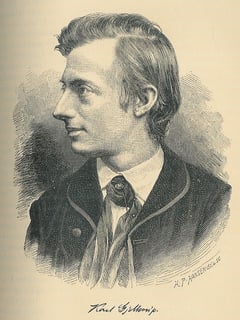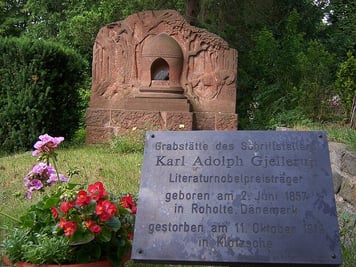One of the highlights of my college years was the semester I spent abroad in Copenhagen, Denmark. During my time there, I took a course titled “Danish Language and Culture.” While the language never found a home in me (I provided hours of free entertainment to my host family as I struggled through my homework each evening), the culture was absolutely fascinating. We learned about Danish contributors to art, design, philosophy, science, and literature, and examined their impact on the country as a whole. One of the cultural entrepreneurs briefly (and a bit harshly) discussed was Karl Adolph Gjellerup, Danish poet, artist, author, and Nobel Prize winner.
 Karl Adolph Gjellerup was born on June 2, 1857 in Roholte, Denmark to pastor Carl Adolph Gjellerup and Anna Fibiger. After his father’s untimely death less than three years later, Gjellerup went to live with his uncle out in the country. He passion for writing began in his school years, and he was encouraged in his pursuit by family and mentors.
Karl Adolph Gjellerup was born on June 2, 1857 in Roholte, Denmark to pastor Carl Adolph Gjellerup and Anna Fibiger. After his father’s untimely death less than three years later, Gjellerup went to live with his uncle out in the country. He passion for writing began in his school years, and he was encouraged in his pursuit by family and mentors.
Though he had a relatively conservative upbringing (his uncle was a parish minister), Gjellerup eventually strayed from traditional beliefs and incorporated elements of German Idealism, English Naturalism, and even Buddhism in his works.
Some of his early works include En idealist (1878), Arvelighed og moral (1881), Rødtjørn (1881), and Aander og tider (1882) (now you understand why the Danish language did not come naturally to me).
While his upbringing dictated the tone of his early works, his later pieces were greatly influenced by two major events in his life. The first was marrying a German woman named Eugenia in October of 1877, and the second was moving to Germany in 1892. Although Gjellrup spent most of his life in Denmark, his decision to move to Germany upset Danes on both the right and left wings of politics and left him wildly unpopular. Gjellrup eventually cut all ties to his home country, and fully supported the German empire. To this day, many consider him to be a German writer, not a Danish one.
 After years and years of hard work, Karl Adolph Gjellerup was recognized for his unique voice and thought-provoking works. He was awarded ½ of the Nobel Prize in 1917 for “His varied and rich poetry, which is inspired by lofty ideals”. The winner of the other half was Henrik Pontoppidan, awarded for “his authentic descriptions of present-day life in Denmark”. Gjellerup’s tragedies, poems, dramas, and novels were well-received by Germans of the time, and continue to be celebrated today. Maybe someday the Danes will take him back, but for now he remains a German pride.
After years and years of hard work, Karl Adolph Gjellerup was recognized for his unique voice and thought-provoking works. He was awarded ½ of the Nobel Prize in 1917 for “His varied and rich poetry, which is inspired by lofty ideals”. The winner of the other half was Henrik Pontoppidan, awarded for “his authentic descriptions of present-day life in Denmark”. Gjellerup’s tragedies, poems, dramas, and novels were well-received by Germans of the time, and continue to be celebrated today. Maybe someday the Danes will take him back, but for now he remains a German pride.









